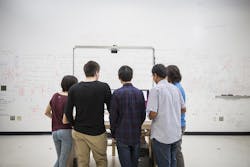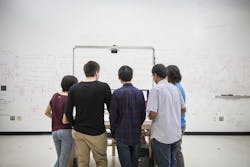Georgia Institute of Technology
Women in Engineering
The Georgia Tech Women in Engineering (WIE) program is dedicated to recruiting top female students into engineering majors and, once enrolled, to ensure the highest level of retention by fostering an environment that encourages curiosity, creativity and intellectual and personal growth. WIE strives to redefine the engineering profession as a positive societal force with the potential to improve the quality of life through the creation of world changing technologies. Read More
Welcome to the Robot Zoo
About a year ago, he had an idea: What if he could break the barriers that keep people out of his field by building a robotics playground for everyone? He mulled over the logistics and, after persuading a few professors and Ph.D. students to join him, he planned the Robotarium.
If all goes according to his designs, the Robotarium will become Georgia Tech’s robot zoo, a home to machines of all shapes and sizes. They’ll be accessible to anyone in the world, which means remote users will be able to upload their own code, run their own experiments, and test their own ideas. Read More
Generators Could Collect Energy From Walking, Running
A two-stage power management and storage system could dramatically improve the efficiency of triboelectric generators that harvest energy from irregular human motion such as walking, running or finger tapping.
The system uses a small capacitor to capture alternating current generated by the biomechanical activity. When the first capacitor fills, a... Read More
Program Overview
Electrical Engineering
The The School of Electrical and Computer Engineering offers two undergraduate degree programs: electrical engineering (EE) and computer engineering (CmpE). Both programs include elective hours, enabling students to individually tailor their programs to provide emphasis in a particular specialization or exposure to a broad range of subjects. Engineering analysis and design concepts are integrated throughout both programs, culminating in a common major design experience involving a broad range of issues including economic and societal considerations.
The EE program offers elective courses in a wide variety of specializations including analog electronics, bioengineering, computer engineering, systems and controls, microsystems and nanosystems, electronics packaging, digital signal processing, optics and photonics, electrical energy, electromagnetics, and telecommunications. Additionally, students may elect to take advanced courses in other programs such as computer science, mathematics, physics, or management.
Mechanical Engineering
The undergraduate curriculum in mechanical engineering (ME) is very broad and flexible. The curriculum comprises a ME core of fundamental concepts, plus a design/professional-practice stem, plus 15 hours of free electives. The program prepares students to be problem solvers and to contribute to a wide range of industries and businesses, or to go on for further study in graduate school. There is a strong emphasis in the ME program on design, creativity, and hands-on learning. Due to the wide range of career choices open to MEs, the program incorporates courses in electronics, materials science, computer programming, and manufacturing. The large number of free elective hours allows students to pursue minors and certificates throughout the Institute, or to specialize in areas within ME. The flexibility also helps students to pursue a variety of special programs including co-op, internships, study abroad, and undergraduate research.
Quick Facts
National Rankings
Undergraduate - Mechanical Engineering, #2
Undergraduate - Electrical Engineering, #4
Graduate - Mechanical Engineering, #5
Graduate - Electrical Engineering, #6




